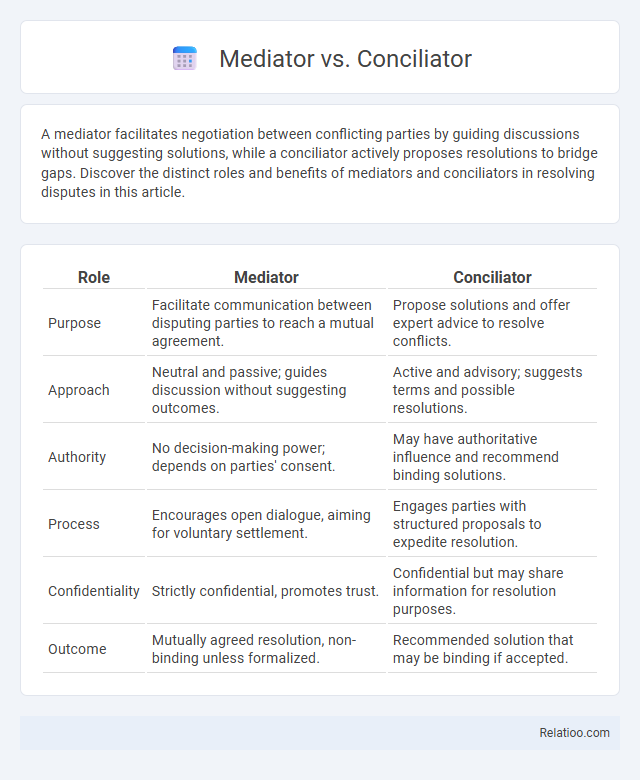A mediator facilitates negotiation between conflicting parties by guiding discussions without suggesting solutions, while a conciliator actively proposes resolutions to bridge gaps. Discover the distinct roles and benefits of mediators and conciliators in resolving disputes in this article.
Table of Comparison
| Role | Mediator | Conciliator |
|---|---|---|
| Purpose | Facilitate communication between disputing parties to reach a mutual agreement. | Propose solutions and offer expert advice to resolve conflicts. |
| Approach | Neutral and passive; guides discussion without suggesting outcomes. | Active and advisory; suggests terms and possible resolutions. |
| Authority | No decision-making power; depends on parties' consent. | May have authoritative influence and recommend binding solutions. |
| Process | Encourages open dialogue, aiming for voluntary settlement. | Engages parties with structured proposals to expedite resolution. |
| Confidentiality | Strictly confidential, promotes trust. | Confidential but may share information for resolution purposes. |
| Outcome | Mutually agreed resolution, non-binding unless formalized. | Recommended solution that may be binding if accepted. |
Understanding Mediation and Conciliation
Mediation involves a neutral third party facilitating communication between disputing parties to help them reach a voluntary agreement, emphasizing collaborative problem-solving. Conciliation, while similar, often entails a conciliator playing a more active role by suggesting solutions and improving communication to resolve conflicts efficiently. Both mediation and conciliation aim to avoid litigation, but mediation prioritizes self-determined agreements, whereas conciliation may guide parties toward settlement through expert recommendations.
Defining the Role of a Mediator
A mediator serves as a neutral third party facilitating communication between disputing parties to help them reach a mutually acceptable agreement. Unlike a conciliator who may offer suggestions or solutions, the mediator primarily guides the negotiation process without imposing decisions. Understanding the mediator's role empowers you to approach conflict resolution with a collaborative mindset focused on open dialogue and voluntary consensus.
Defining the Role of a Conciliator
A conciliator facilitates communication between disputing parties to help them reach a mutual agreement by clarifying misunderstandings and proposing solutions, distinct from a mediator who primarily guides negotiations without offering explicit recommendations. Unlike an arbitrator who renders binding decisions, a conciliator's role is non-binding and emphasizes restoring relationships through cooperative dialogue. Your success in dispute resolution can significantly improve by understanding how a conciliator actively fosters trust and openness to achieve amicable settlements.
Key Differences between Mediators and Conciliators
Mediators facilitate communication between disputing parties to help them reach a mutually acceptable agreement without offering solutions, emphasizing neutrality and process management. Conciliators take a more active role by proposing solutions and offering expert advice to resolve conflicts, often guiding parties towards a settlement. The key difference lies in the mediator's role as a neutral facilitator versus the conciliator's role as an advisor and problem-solver.
Approaches Used in Mediation vs Conciliation
Mediation employs a collaborative approach where the mediator facilitates dialogue to help parties reach a voluntary agreement, focusing on mutual interests and problem-solving techniques. Conciliation involves the conciliator actively proposing solutions and offering suggestions to settle disputes, often taking a more advisory and evaluative role than mediation. While mediators prioritize joint decision-making and maintaining relationships, conciliators emphasize guiding parties toward compromise through direct recommendations.
Benefits of Mediation in Conflict Resolution
Mediation offers a confidential, cost-effective process that empowers parties to reach mutually acceptable agreements without court intervention. Unlike conciliators who may offer solutions, mediators facilitate communication and understanding, enabling parties to develop their own resolutions and preserve relationships. The benefits of mediation include enhanced control over outcomes, faster dispute resolution, and reduced emotional stress compared to arbitration or litigation.
Advantages of Conciliation in Dispute Settlement
Conciliation offers a flexible and informal approach to dispute settlement, empowering parties to reach mutually agreeable solutions without the rigidity of formal procedures. Unlike mediation or arbitration, conciliation fosters direct communication facilitated by a conciliator who actively proposes solutions, accelerating resolution and reducing costs. This method enhances confidentiality, preserves relationships, and provides a tailored resolution process adaptable to diverse legal and cultural contexts.
Situations Best Suited for Mediators
Mediators excel in situations where parties need a neutral third party to facilitate dialogue and help them reach a mutually acceptable agreement without imposing a decision. Your best outcomes occur in disputes involving interpersonal conflicts, commercial disagreements, or community issues where preserving relationships is crucial. Unlike conciliators who may offer solutions or arbitrators who issue binding rulings, mediators guide open communication and foster collaborative problem-solving tailored to the unique dynamics of the conflict.
When to Choose Conciliation Over Mediation
Conciliation is preferable when parties require a more proactive third party to propose solutions and facilitate settlement, especially in disputes lacking trust or communication. Unlike mediation, where the mediator primarily guides discussion, a conciliator actively suggests terms to help Your case move forward efficiently. Choose conciliation when quicker resolution with expert advice is needed, while mediation suits conflicts demanding collaborative negotiation.
Conclusion: Selecting the Right Process for Effective Dispute Resolution
Choosing between a mediator, conciliator, or arbitrator depends on the desired level of formality, control over the outcome, and the complexity of the dispute. Mediators facilitate dialogue and mutual agreement without imposing decisions, making them ideal for collaborative dispute resolution. Conciliators provide expert advice to bridge gaps, while arbitrators render binding decisions, suitable for parties seeking finality and legal enforceability in conflict resolution.

Infographic: Mediator vs Conciliator
 relatioo.com
relatioo.com